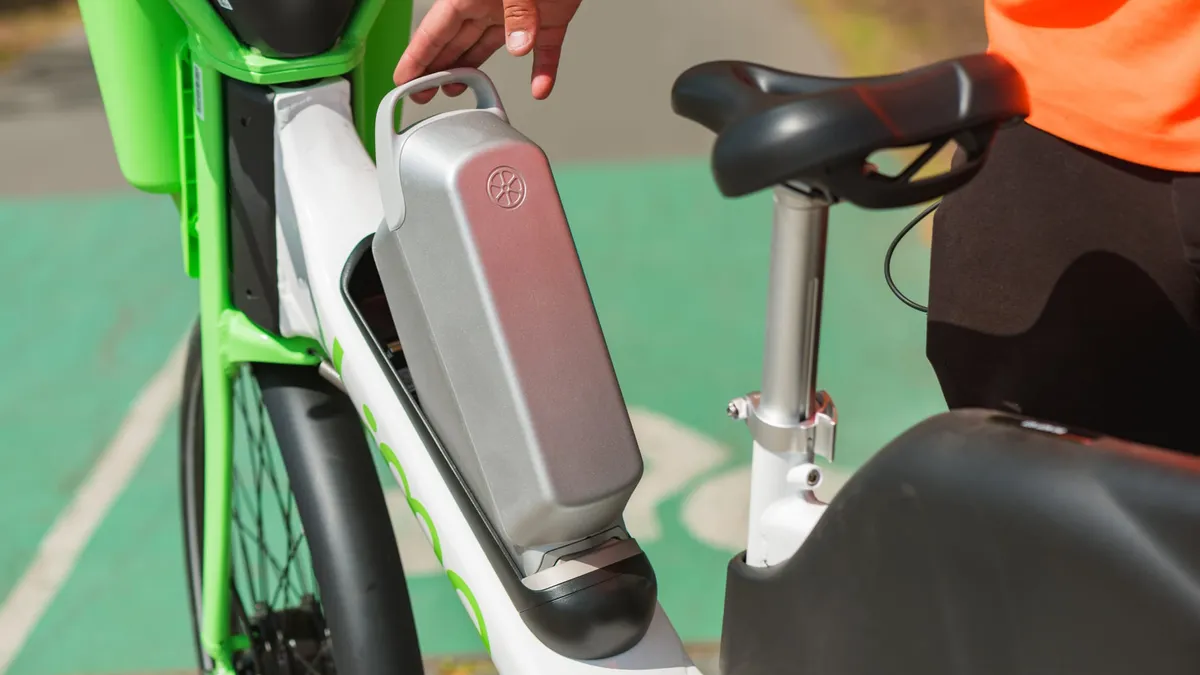Dive Brief:
- Battery recycler Redwood Materials has partnered with micromobility company Lime to recover and recycle battery materials from end-of-life e-bikes and e-scooters.
- The deal makes Redwood Materials the exclusive battery recycling partner for Lime’s scooters and bikes throughout the United States, as well as in Germany and The Netherlands, according to a news release.
- Redwood aims to recover and recycle materials from the batteries such as lithium, cobalt, nickel and copper. Redwood expects that about 95% of those recovered materials will be “reintegrated into the battery supply chain.”
Dive Insight:
The partnership comes as recyclers call for improved battery recycling systems in the U.S., particularly for lithium-ion batteries. Advocates say better domestic systems help reduce the country’s dependence on international supply chains and avoid battery-related fires in recycling facilities and around major cities.
“As e-bike and e-scooter adoption continues to grow, so does the need to responsibly recycle the batteries that power them,” said Alexis Georgeson, Redwood’s vice president of government relations and communications. “These batteries contain valuable critical minerals that, when recovered and reused, can help build a more sustainable and resilient domestic battery supply chain.”
The ability to handle a large amount of batteries was a major reason Lime partnered with Redwood, the companies said in a statement. Lime says it has “hundreds of thousands of batteries” that will at one point reach end of life.
Medium-format batteries, such as the kinds used to power Lime’s scooters, can be a challenge to recycle in the U.S. due to collection and transportation restrictions due to the batteries’ size and shipping classification under the U.S. Department of Transportation. Lime says it “places the utmost care in following strict regulations for transport, storage, and recycling,” and its partnership with Redwood will strengthen that supply chain.
Lime and Redwood’s partnership also comes at a time when state legislators and battery recycling groups are establishing improved recycling systems for medium-format batteries.
In 2026, Illinois and Vermont will implement battery extended producer responsibility programs that will encompass medium-format batteries. Waste groups like the National Waste and Recycling Association have supported such legislation as a way to more responsibly manage such materials.
Redwood says it is expanding operations in Nevada and is working on building a second facility Charleston, South Carolina.
Redwood has mainly focused on private funding sources to raise capital. It received a DOE loan commitment in 2023 for the construction and expansion of a battery materials campus in McCarran, Nevada. But the company decided to discontinue its agreement with the federal government last year without drawing any funds.
Lime says this recycling partnership also helps advance its sustainability goals. The company aims to reach net zero emissions by 2030 and says it’s in the process of decarbonizing across scope 1, 2 and 3 emissions.
Lime plans to continue pursuing other partnerships for its end-of-life batteries, including reuse options. In Europe, the company has worked with companies to identify batteries that can be used for “second life applications” such as portable speakers and battery packs. “Even when batteries are no longer fully functional for powering transportation modes, Lime found that many individual cells often still have plenty of life left,” the company stated.
Its next carbon emissions report will come out in May, the company said. Lime says it has reduced carbon emissions by 59.5% from a 2019 baseline.















